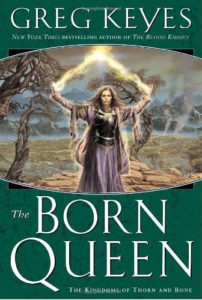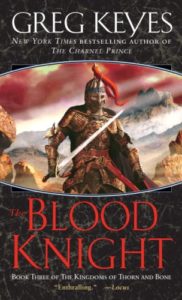 We’ve both finished reading The Born Queen, the conclusion to Greg Keyes’ The Kingdoms of Thorn and Bone. Yesterday we spent the day reading in tandem on the couch: I read book 3, Katie read book 4, and finished within an hour of each other. Determined to catch up, I read 100 pages last night and spent this morning and afternoon reading the final book.
We’ve both finished reading The Born Queen, the conclusion to Greg Keyes’ The Kingdoms of Thorn and Bone. Yesterday we spent the day reading in tandem on the couch: I read book 3, Katie read book 4, and finished within an hour of each other. Determined to catch up, I read 100 pages last night and spent this morning and afternoon reading the final book.
It was well worth the wait.
The series is set two millennia after humans, led by Virginia Dare (explaining where the lost Roanoke colonists went), overthrew the demonic race that had kept them as slaves for generations. Virginia had discovered how to harness the sedos power, essentially magic. The last of humanity’s oppressors warned them that the sedos would eventually destroy their world. Of course, no one believed him.
2200 years later, this corner of the world is not unlike Europe in the early Renaissance. Except that the church is based on the sedos, in the person of saints, and its priests walk the paths to harness the sedos powers.
The world is also beginning to rot. Things of nature are dying, human alliances are crumbling, and terrible creatures thought to be myth are walking the earth. There are several factions who claim that they want to save it, but their true goals are suspect, and their methods differ greatly. The various viewpoint characters are thrust into the middle of things without any real sense of what’s going on: a holter, a princess, a novice priest, a knight, a swordsman, a composer and a queen.
One of the things I find so fascinating about this series (as I mentioned when I first read The Blood Knight) is the fact that everyone is acting on partial information. This makes them screw up, sometimes mildly, sometimes horrifically. And there’s a curveball that comes about 1/3 of the way into The Born Queen that turns everything on its head.
I don’t think it’ll give too much away to say that one of the key struggles in this book is for control of the sedos. Even 100 pages from the end, I wasn’t sure which faction would give the world a better chance of surviving.
Music also figures importantly, starting with the second book, where it’s learned that certain combinations of sound can have a profound effect on the human psyche. I found myself wondering whether Keyes had someone set any of the songs to music.
By the end of The Born Queen, most of the major questions about what’s really going on have been answered. Of course, they’re answered in pieces, by different characters with different agendas. The major characters’ arcs reach (mostly) satisfying conclusions, with some finding what they want, some finding what they need, some doing what needs to be done, and some getting what they deserve.
It’s weird to finally be done with the series, which started around the same time as this blog. The first post that I made that wasn’t “Hey, look! I have a blog!” was a review of The Waterborn and The Blackgod, Greg Keyes’ first novel and its sequel. In it, I mentioned looking forward to The Briar King when it came out.


